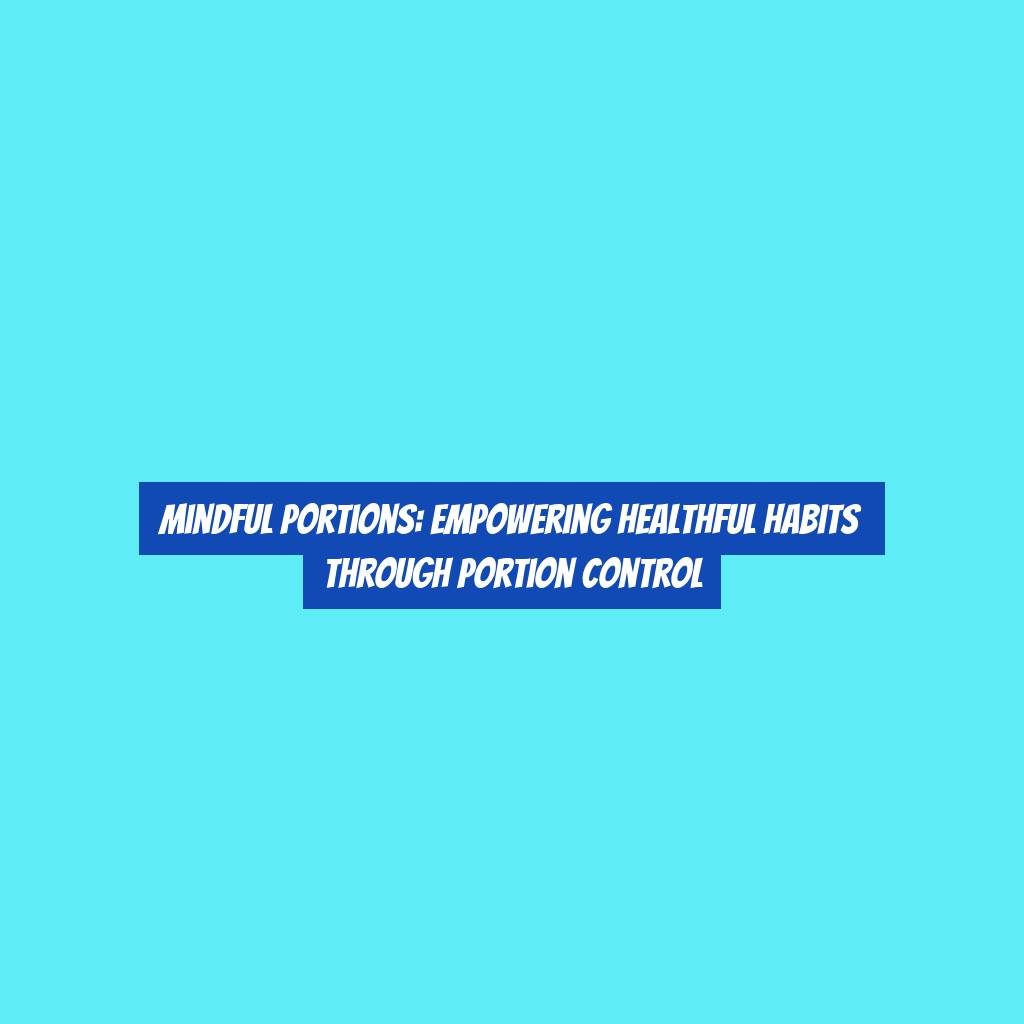Mindful Portions: Empowering Healthful Habits Through Portion Control
You may think that portion control means deprivation and constant hunger, but itG??s actually about empowering yourself to make mindful choices that support your health and well-being.
By understanding the impact of portion distortion and practicing mindful eating techniques, you can cultivate a healthier relationship with food and enjoy the benefits of controlled portions.
Are you ready to take charge of your eating habits and discover practical tips for incorporating portion control into your daily routine?
Understanding Portion Distortion
Understanding portion distortion is essential for making informed choices about your food intake. ItG??s easy to fall into the trap of thinking that larger portions are better value for money or that they provide more satisfaction. However, portion distortion occurs when people underestimate the actual serving size and consume more than they need. This can lead to overeating and weight gain over time.
By recognizing portion distortion, you can take control of your eating habits. Start by familiarizing yourself with recommended portion sizes for different food groups. For example, a serving of meat should be about the size of a deck of cards, while a serving of pasta is about the size of a tennis ball.
When dining out, be mindful of oversized portions and consider sharing with a friend or taking half home for later.
Additionally, be mindful of external cues that may influence your portion sizes, such as the size of your plate or package. By being aware of portion distortion and practicing mindful eating, you can better manage your food intake and make healthier choices for your overall well-being.
Mindful Eating Techniques
To develop mindful eating habits, focus on being fully present and attentive to your food choices and eating experience. Start by slowing down your eating pace. Chew your food thoroughly and savor each bite. This allows you to tune in to your bodyG??s signals of fullness, preventing overeating.
Another technique is to eliminate distractions while eating. Put away electronic devices and turn off the TV to concentrate on the sensory experience of your meal. Pay attention to the flavors, textures, and aromas of the food.
Additionally, practice gratitude for your meal. Acknowledge the effort that went into preparing it and the nourishment it provides for your body. It can help foster a positive relationship with food.
Mindful portion control involves listening to your bodyG??s hunger and fullness cues. Before reaching for seconds, pause and assess whether youG??re truly still hungry. This mindful approach can lead to more balanced eating habits and a greater appreciation for the food you consume.
Benefits of Controlled Portions
Controlled portions can help you manage your weight and prevent overeating. By being mindful of the amount of food you consume, you can experience several benefits that contribute to your overall health and well-being.
-
Weight Management: Controlled portions assist in regulating calorie intake, which is essential for weight management. By consuming appropriate portion sizes, you can avoid consuming excess calories that may lead to weight gain.
-
Prevent Overeating: Portion control helps prevent overeating by providing a clear guideline for how much food is appropriate to consume in one sitting. This can help you avoid feeling uncomfortably full and reduce the likelihood of consuming more calories than your body needs.
-
Balanced Nutrition: Controlled portions encourage a more balanced and varied diet. By focusing on portion sizes, you can ensure that your meals include a variety of nutrients from different food groups, promoting overall nutritional balance.
-
Digestive Health: Proper portion control supports healthy digestion. Overeating can lead to discomfort and digestive issues, while controlled portions promote smoother digestion and better nutrient absorption.
Practical Tips for Portion Control
Start by using smaller plates and bowls to help control your portion sizes and prevent overeating. Research shows that people tend to eat less when their food is served on smaller plates. This simple trick can help you reduce your portion sizes without feeling deprived.
Another practical tip is to measure your food portions using measuring cups or a food scale. This can help you become more aware of appropriate portion sizes and prevent you from unknowingly overeating.
Additionally, try to eat slowly and savor each bite. It takes about 20 minutes for your brain to register that youG??re full, so eating slowly can help you avoid overeating.
When dining out, consider sharing a meal with a friend or packing half of your meal to-go before you start eating. Restaurant portions are often larger than what you need, so sharing or saving half for later can help you avoid consuming more than necessary.
Lastly, be mindful of liquid calories. Beverages like soda, juice, and alcohol can contribute a significant amount of calories to your diet. Opt for water or other low-calorie drinks to help control your overall calorie intake.
Building a Healthier Relationship With Food
Develop a healthy and balanced approach to your food choices to build a positive relationship with eating that supports your well-being. Building a healthier relationship with food is essential for overall wellness and can be achieved by implementing the following strategies:
-
Mindful Eating: Pay attention to the sensory experience of eating, such as the taste, texture, and aroma of food. This helps you become more aware of your bodyG??s hunger and fullness cues, leading to a more enjoyable and satisfying eating experience.
-
Ditch the Guilt: Release yourself from feelings of guilt or shame associated with food. Understand that all foods can fit into a balanced diet, and itG??s the overall pattern of eating that matters. Enjoy your favorite treats in moderation without negative self-judgment.
-
Cook and Prepare Meals: Take the time to cook and prepare your meals using fresh, whole ingredients. This not only allows you to have more control over portion sizes but also fosters a deeper connection with the food you consume.
-
Seek Professional Help: If you struggle with disordered eating patterns or have a complicated relationship with food, consider seeking support from a registered dietitian or therapist specializing in eating disorders. Professional guidance can help you develop a healthier mindset towards food and eating.
Conclusion
In conclusion, by practicing mindful portion control, you can empower yourself to develop healthful eating habits. Understanding portion distortion and implementing mindful eating techniques can lead to numerous benefits, including weight management and improved overall health.
By following practical tips for portion control and building a healthier relationship with food, you can take control of your eating habits and make positive changes for your well-being. Remember, small changes in portion size can lead to big improvements in your health.


